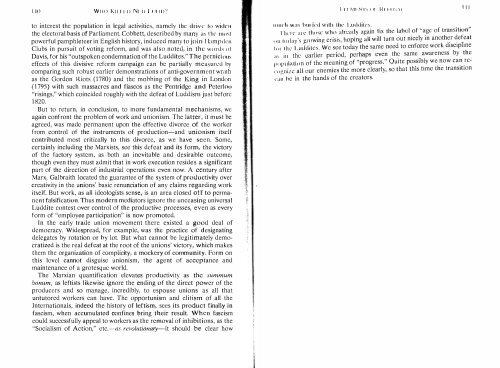CONTENTS - ouroboros ponderosa
CONTENTS - ouroboros ponderosa
CONTENTS - ouroboros ponderosa
You also want an ePaper? Increase the reach of your titles
YUMPU automatically turns print PDFs into web optimized ePapers that Google loves.
I III Will ) KiLl I>!) NI [J 1.IHlll'!<br />
to interest the population in legal activities, namely Ihe drive 10 wid,' "<br />
the electoral basis of Parliament. Cobbett, described by many as I he IIIl1sl<br />
powerful pamphleteer in English history, induced many to join llampdcu<br />
Clubs in pursuit of voting reform, and was also noted, in the words 01<br />
Davis, for his "outspoken condemnation of the Luddites." The pernici"",<br />
effects of this divisive reform campaign can be partially measured hy<br />
comparing such robust earlier demonstrations of anti-government wralh<br />
as the Gordon Riots (1780) and the mohhing of the King in London<br />
(1795) with such massacres and fiaseos as the Pcntridge and Peterlo"<br />
"risings," which coincided roughly with the defeat of Luddism just before<br />
1820.<br />
But to return, in conclusion, to more fundamental mechanisms, we<br />
again confront the problem of work and unionism. The latter, it must be<br />
agreed, was made permanent upon the effective divorce of the worker<br />
from control of the instruments of production-and unionism itself<br />
contributed most critically to this divorce, as we have seen. Some,<br />
certainly including the Marxists, see this defeat and its form, the victory<br />
of the factory system, as both an inevitable and desirahle outcome,<br />
though even they must admit that in work execution resides a significant<br />
part of the direction of industrial operations even now. A century after<br />
Marx, Galbraith located the guarantee of the system of productivity over<br />
creativity in the unions' basic renunciation of any claims regarding work<br />
itself. But work, as all idcologists sense, is an area closed off to permanent<br />
falsification. Thus modcrn mediators ignore the unceasing universal<br />
Luddite contest over control of the productive processes, even as every<br />
form of "employee participation" is now promoted.<br />
In the early trade union movement there existed a good deal of<br />
democracy. Widespread, for example, was the practice of designating<br />
delegates by rotation or hy lot. But what cannot be legitimately democratized<br />
is the real defeat at the root of the unions' victory, which makes<br />
them the organization of complicity, a mockery of community. Form on<br />
this level cannot disguise unionism, the agent of acceptance and<br />
maintenance of a grotesquc world.<br />
The Marxian quantification elevates productivity as the summum<br />
honum, as leftists likewise ignore the ending of the direct power of the<br />
producers and so manage, incredibly, to espouse unions as all that<br />
untutored workers can have. The opportunism and elitism of all the<br />
Internationals, indeed the history of leftism, sees its product finally in<br />
fascism, when accumulated confines bring their result. When fascism<br />
could successfully appeal to workers as the removal of inhibit ions, as the<br />
"Socialism of Action," etc.-1 )Illilation of the meaning of "progress." Quite possibly we now can rc<br />
, ., )gllizc all our enemies the more clearly, so that thiS tIme the transltlon<br />
enl he in the hands of thc creators.<br />
III






